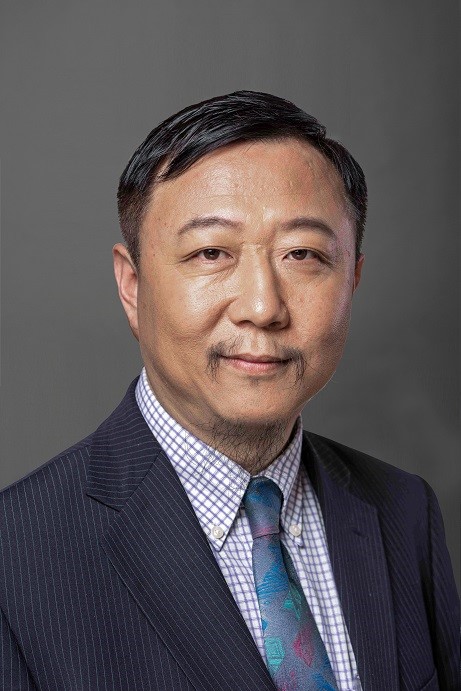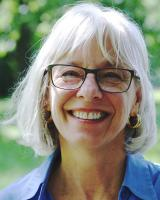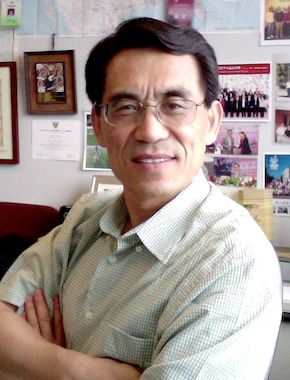

Invited Speakers
(Arranged alphabetically by last name)
 Bojie Fu
Bojie Fu (Professor, Beijing Normal University/Chinese Academy of Sciences, China)
Prof. Fu is Member of Chinese Academy of Sciences, Fellow of the Academy of Sciences for Developing World (TWAS) and Corresponding Fellow of the Royal Society Edinburgh UK. Prof. Fu is the President of Chinese Geographical Society, Vice President of International Association for Ecology (INTECOL), MEP member of the Intergovernmental Platform on Biodiversity and Ecosystem Services (IPBES), Deputy Director of scientific committee of Chinese Ecosystem Research Network and Vice Chair of CNC- Future Earth. His research focuses on interactions between human beings and the environments. He published more than 400 scientific papers and 10 books, over 190 in international journals including Science. He is one of pioneers for the development of landscape ecology in China. His achievements made significant contributions to the understanding of interactions between landscape pattern and ecological processes, land use change and ecological effects, and ecosystem services assessment and management. His researches won the China National Natural Sciences Prize in 2005, National Sciences & Technology Advanced Prize in 2012, and Award of Distinguished Service of International Association for Landscape Ecology in 2011. (Homepage: http://sourcedb.cas.cn/sourcedb_rcees_cas/yw/cm/200906/ t20090612_1038159.html)
 Peng Gong
Peng Gong (Professor, Tsinghua University, China)
Prof. Gong’s research is on the use of remote sensing and geographic information systems (GIS) technology to monitor and map natural resources and human settlements. Computer based pattern recognition, statistical analysis, mathematical modeling are studied for the extraction of information from imagery data acquired by sensors in the field or on board of aircraft and satellites. His goal is to develop effective and efficient methods that provide spatial information or spatial evidence to scientists, policy makers and decision makers. Such information can be used to better understand environmental changes, to make better policies for environmental protection, and to form wiser decisions on the use of our resources for sustainable development of human society. His specific interests include computer recognition of forest species based on both morphological and spectral information in remotely sensed data; estimating biophysical and biochemical parameters from forest lands through processing and analysis of hyperspectral and high spatial resolution data; land-cover and land-use classification and change detection at various spatial scales; forest fire mapping with AVHRR data and fire emission estimation; lidar data analysis for natural resources measurement; environmental measurements and infectious disease (schistosomiasis and malaria) transmission modeling with GIS and remote sensing. (Homepage: http://www.tsinghua.edu.cn/publish/essen/7710/2 017/2017022003572083126153 8/20170220035720831261538_.html)
 Chunyang He
Chunyang He (Professor, Beijing Normal University, China)
Prof. He is the Deputy Director of State Key Laboratory of Earth Surface Processes and Resource Ecology (ESPRE), the Executive Associate Director of Center for Human-Environment System Sustainability (CHESS), and the Director of Committee of Sustainable Resource Utilization and Disaster Reduction (CSRUDR), China Society of Natural Resources. His research mainly focuses on urban sustainability, landscape sustainability, and land system architecture. Prof. He was invited as editorial board member of SCI journals of ‘Landscape Ecology” and “Journal of Disaster Risk Science”. Since 2000, Prof. He has published more than 100 scientific papers and 3 books, over 50 in SCI/SSCI journals including Global Change Biology and Remote Sensing of Environment. (Homepage: http://chess.bnu.edu.cn/faculty/hcy/en/index.html)
 Wenjun Li
Wenjun Li (Professor, Peking University, China)
Prof. Li’s research interests are in natural resource management broadly and she has been devoted to exploring the root cause of rangeland degradation. She adopted non-equilibrium ecosystem perspectives to demonstrate that the precipitation level and its extreme fluctuations are the primary factors affecting grassland productivity in Inner Mongolia, while the impacts of overgrazing is less obvious in large scale. Her research theoretically clarifies the reasons why past rangeland management policies of China couldn’t effect permanent cure for the rangeland root issues. Through the perspectives of “ability to benefit”, her empirical studies enrich theoretical knowledge on traditional property rights, and substantiate the point that Grassland Household Contract System does not fit to the non-equilibrium ecological characteristics of the arid and semi-arid rangelands. She further articulates the understanding that inappropriate institutional arrangement is the actual cause of rangeland degradation. She argues that flexible and diversified property right arrangements are necessary in pastoral regions. (Homepage: http://en.cese.pku.edu.cn/index.php?action=viewteacher&id=62)
 Yonghong Li
Yonghong Li
(Professor, Inner Mongolia University, China)
Prof. Li was a senior researcher of the Land and Environment Department of the Royal Institute of Grassland Agriculture in New Zealand. Currently, Prof. Li is the Dean of the School of Ecology and Environment in Inner Mongolia University. Prof. Li won the Chinese Academy of Sciences’ Young Scientist Award, and was selected in national 'Millions of Talent Project.' His research mainly focuses on terrestrial ecosystems in Mongolian Plateau, which involves vegetation ecology, climate change, carbon sequestration, ecological restoration, grassland utilization, environmental protection, and ecosystem simulation and management. Prof. Li has published more than 100 articles. (Homepage: http://see.imu.edu.cn/info/1081/1895.htm)
 Sandra Luque
Sandra Luque (Professor, National Research Institute of Science and Technology for Environment and Agriculture, France)
Prof. Luque is the Director of Research at IRSTEA - National Research Institute of Science and Technology for Environment and Agriculture, France and the Honorary Senior Researcher of Centre for Biological Diversity (CBD) in University of St Andrews, United Kingdom. At present, she is nominated Chair for the IUFRO Working Party “Forest Landscape Ecology” (Division 8); the group has more than 650 experts all over the world. She is also the Deputy Coordinator for the Division 8 – Forest Environment in IUFRO. She was elected Vice-president of IALE (International Association for Landscape Ecology) where she served from 2005 to 2013. She is nominated Expert for the Intergovernmental Science-Policy Platform on Biodiversity and Ecosystem Services (IPBES), on the development of a guide to the production and integration of assessments from and across all levels. She is leading the ESP BIOME Expert Group on Temperate & Boreal Forest (a platform for researchers and practitioners to exchange information and discuss ideas and experiences on Assessment of Ecosystem Services provided by the various types of temperate and boreal forest ecosystems). She recently served as one of the FAO Expert Panel Members in support of the Evaluation of the CGIAR Research Program on Forest, Trees and Agro-Forestry, on the development of a guide to the production and integration of assessments from and across all levels. As a landscape ecologist, Prof. Luque’s research interests cover a broad range of areas that include geography, ecology, global change (terrestrial ecosystems), landscape change dynamics, biodiversity indicators and conservation and management of natural resources, in particular forests. Her interests and experience focuses on spatial heterogeneity and landscape patterns: how to characterize pattern, how it develops and changes through time, and its implications for communities, and ecosystem processes. (Homepage: https://synergy.st-andrews.ac.uk/diversity/dr-sandra-luque/)
 Joan Nassauer
Joan Nassauer (Professor, University of Michigan, Untied States)
Dr. Nassauer is Professor of Landscape Architecture at the School for Environment and Sustainability. She was named Fellow by the American Society of Landscape Architects (1992), Fellow of the Council of Educators in Landscape Architecture (2007), and Distinguished Practitioner of Landscape Ecology in the US (1998) and Distinguished Scholar (2007) by the International Association of Landscape Ecology. She focuses on the cultural sustainability of ecological design in human-dominated landscapes. Her research offers knowledge and strategies for basing ecological design on cultural insight, strong science, and creative engagement with policy. Her teaching and recent projects apply this approach to brownfields, vacant property, exurban sprawl, and agricultural landscapes. An early discovery and continuing theme of her research is that evidence of human care in the landscape has a powerful normative effect on human perceptions and behavior to change landscapes. Her research has influenced green infrastructure design, ecological restoration, urban and rural watershed management, transportation planning, and the development of metropolitan neighborhoods and brownfields. The author of more than 80 refereed papers and books, she addressed ecological design in Placing Nature (Island Press 1997), and showed how to use scenario approaches to integrated assessment in From the Corn Belt to the Gulf (RFF Press 2007). Current research projects address ecological design for highly vacant urban neighborhoods, ecological implications of suburban landscape patterns, and agricultural landscape patterns to incorporate perennial biofuels. (Homepage: http://www.joan-nassauer.com/)
 Paul Opdam
Paul Opdam (Professor, Wageningen University, The Netherlands)
Prof. Paul Opdam is a retired professor from Wageningen University, The Netherlands. He occupied the landscape in spatial planning chair at Wageningen University (Land use planning group) and also had been a senior researcher at ALTERRA research institute, which is part of Wageningen University Research Center, NL. He pioneered in developing a spatial approach for conservation biology in heavily used landscapes, thus providing a scientific basis for the planning of ecological networks. In more recent work he considers incorporating the sustainability concept into multifunctional landscape planning and design based on concepts such as landscape services, green infrastructure and social-ecological networks. Currently he is specially interested in the influence of landscape knowledge on decision making in landscape governance. (Homepage: http://www.wur.nl/nl/Personen/Paul-prof.dr.-PFM-Paul-Opdam.htm)
 Peter Verburg
Peter Verburg (Professor, VU University Amsterdam, The Netherlands)
Dr. Verburg is professor of Environmental Spatial Analysis and leads the Environmental Geography group that is part of the Department of Earth Sciences and affiliated with the Institute for Environmental Studies, VU University Amsterdam. He has established a leading position in the field of land use analysis and modelling. He has developed and applied a wide range of methods to analyze spatial patterns of land use at scales from local to global. Methods used in his research originate from different disciplines, including social sciences (interviews, participatory workshops, multi-level statistics, foresight and scenario studies), econometrics (efficiency analysis, spatial econometrics), geography (accessibility analysis, spatial modelling, remote sensing) and earth sciences (biogeochemical modelling). Having worked with collaborators from this wide variety of fields, he has established insight in the different disciplinary traditions and vocabularies which facilitates interdisciplinary collaboration. His work on regional and global scale land use modeling has resulted in one of the most frequently used land use models worldwide (CLUE). He chairs the Global Land Project of Future Earth and is actively involved in several EU-level research projects in the field of land use, sustainable city planning, climate change adaptation, rural development and ecosystem services. He has published over 180 peer-reviewed articles and several book chapters. He has organized workshops and post-graduate courses on the topic of land use modelling and ecosystem services. (Homepage: http://www.environmentalgeography.nl/site/staff/peter-verburg/)
 Jianguo Wu
Jianguo Wu (Professor, Beijing Normal University, China/Arizona State University, United States)
Dean’s Distinguished Professor of Landscape Ecology and Sustainability Science, School of Life Sciences & Global Institute of Sustainability, Arizona State University, Tempe, Arizona, USA. Founding Director, Center for Human-Environment System Sustainability (CHESS), Beijing Normal University, Beijing, China. B.S. (1982) in biology from Inner Mongolia University and M.S. (1987) and Ph.D. (1991) in ecology from Miami University, Oxford, Ohio, USA. National Science Foundation (NSF) postdoctoral fellow at Cornell University (1991-1992) and Princeton University (1992-1993). Current research areas: landscape ecology, biodiversity and ecosystem functioning, urban ecology, and sustainability science. Authored/edited 13 books and about 280 peer-reviewed journal articles and book chapters. Co-PI and Leadership Team member for the Central Arizona-Phoenix Long-Term Ecological Research project (CAP-LTER) since its inception in 1997, and a founding faculty member of Global Institute of Sustainability (2004) and School of Sustainability (2007) at Arizona State University.
Editor-in-Chief of Landscape Ecology since 2005, and Editorial Board member for Ecological Economics, Frontiers in Energy, Landscape and Ecological Engineering, Acta Ecologica Sinica, Chinese Journal of Applied Ecology, and Biodiversity Science. Other professional services: Chair of Asian Ecology Section of Ecological Society of America (1999-2000); Program Chair of the US Association for Landscape Ecology (US-IALE) in 2001; Councilor-at-Large of US-IALE (2001-2003); Founding Director of the Sino-US Center of Conservation, Energy and Sustainability Science (SUCCESS; 2007-2012). Major awards and honors: American Association for the Advancement of Science (AAAS) Award for International Scientific Cooperation (2006); Elected AAAS Fellow (2007); Leopold Leadership Fellow (2009); Distinguished Landscape Ecologist Award from United States Association for Landscape Ecology (2010); Served with Distinction as Editor-in-Chief of Landscape Ecology from the United States Association for Landscape Ecology (2010); Outstanding Scientific Achievements Award from International Association for Landscape Ecology (2011); Distinguished Service Award from the United States Association for Landscape Ecology (2012); Outstanding International Scientific and Technological Cooperation Award, The Government of Inner Mongolia Autonomous Region (2012). (Homepage: http://leml.asu.edu/jingle/index.html)
 Deyong Yu
Deyong Yu (Professor, Beijing Normal University, China)
Prof. Yu is the Associate Director of Center for Human-Environment System Sustainability (CHESS) at Beijing Normal University, and editorial board member of SCI journal of “Journal of Disaster Risk Science”. His major research interest lies in landscape ecology, especially landscape pattern and ecological process, landscape connectivity, land use/cover change and its environmental effects, etc. In the last five years, he mainly focused on how climate change and land use/cover change affect ecosystem services, and how to develop adaptive land system scheme under changing world. He has published more than one hundred scientific papers and four books, over 40 papers published in the international journals. (Homepage:http://jsgrzy.bnu.edu.cn/Public/htm/news/5/18.html)